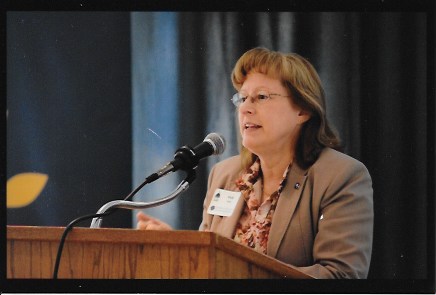You have /5 articles left.
Sign up for a free account or log in.
Vickie Cook is among the most well-known and respected leaders and scholars in the world of higher education and online learning. I’m honored that Cook agreed to answer some of my questions about her alternative-academic career.
Q: My hope in this Q&A is to ask you about your experience, and advice, as an alternative academic. But so that everyone has some context, can you first help us understand what your job entails as the executive director of online, professional and engaged learning at the University of Illinois?
A: Online, Professional and Engaged Learning (OPEL) at UIS promotes learning through initiatives in four departments: Center for Online Learning, Research, and Service (COLRS); Continuing and Professional Education (CAPE); Office of Engaged Learning (OEL); and the Center for Faculty Excellence (CFE).
First related to online learning, I oversee the coordination of all support for our online academic programs. My team provides faculty support, marketing consultation, faculty development in online learning, support for academic programs related to market research and other related needs for new and existing programs. I provide oversight of all functions related to management and scheduling of online programs in consultation with individual colleges on campus. My team also coordinates with units that provide student support services in technology, and academic support such as tutoring, as well as other student life and student services across campus that extend the campus experience for students.
Related to professional learning, I oversee the areas of continuing education, summer camps and related customizable contracts with local businesses and organizations seeking continuing education and professional development. The Center for Faculty Excellence provides internal professional development for UIS faculty.
The Office of Engaged Learning is an area that oversees credit-bearing undergraduate internship programs and study away programs.
This fairly new unit is the result of institutional reorganization. Each of these areas are growth areas for the institution.
Q: In your career, you’ve been a professor, a dean, a VP, a consultant, a director and now an executive director. How have you navigated your alternative-academic career? What have you done to support alternative academics in your leadership roles? And what advice might you give to others like yourself (and me) trying to navigate an alt-ac career?
A: I have navigated my own career by working with a group of excellent mentors. I have been very fortunate to have had other alternative-academic professionals who were willing to assist me and guide me through the nuances of my career. I have done my best to provide the same type of guidance to others who are now seeking to work toward their own alternative-academic pathways.
I have been very focused on encouraging staff and colleagues to seek out their degree options, to work with organizations outside the university and build networks within the professional community. I also have been very active in a variety of professional organizations such as UPCEA, OLC and others to assist with the professional development of those who are entering an alternative-academic career pathway for the first time.
I believe it is very important to have these conversations with faculty colleagues who are interested in roles outside of traditional teaching or research roles, as well. A number of colleagues that I have known started out on a faculty trajectory and determined that it was not as fulfilling as they had anticipated. Rather than lose great colleagues to industries outside of higher education, conversations about other options can be helpful as individuals determine their most effective pathway in finding a fulfilling career.
Q: Let’s talk about higher ed after COVID. What do you think will be different? What should colleges and universities be doing now to prepare for the post-pandemic university? And finally -- related to higher education -- what is keeping you up at night?
A: I think much will be different in higher education post-COVID. I believe the expectations of both students and faculty will be different. I believe that students will expect more effective use of technology.
I believe faculty will expect students to more effectively utilize learning tools to demonstrate mastery of learning outcomes. I also think that universities will need to rethink budgets and appropriations for facilities and support on campuses when compared to the amounts they are spending on technology, digital security, digital accessibility and open educational resources available to all students. Marketing and admissions expectations will change -- have already changed. All of these aspects will create change in higher education as we knew it in January 2020. Others have provided solid documentation on trends that are anticipated. Watching those trends and determining the best path forward in higher education is critical.
What is keeping me up at night is how we will manage the challenges financially that COVID-19 has caused while still meeting the needs of our students. At the end of the day, universities must meet the needs of their students by providing strong teaching, strong research opportunities and the ability to demonstrate a positive effect on our world. No small task. But, the good news is, we have good people across the country that will help move higher ed forward.








